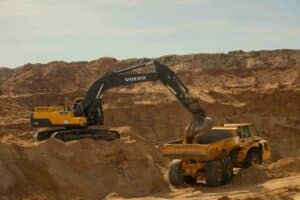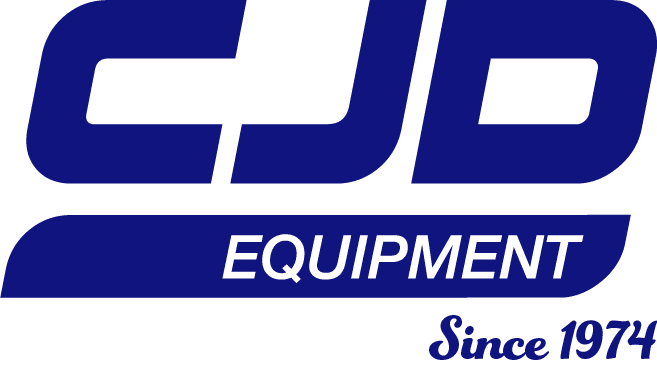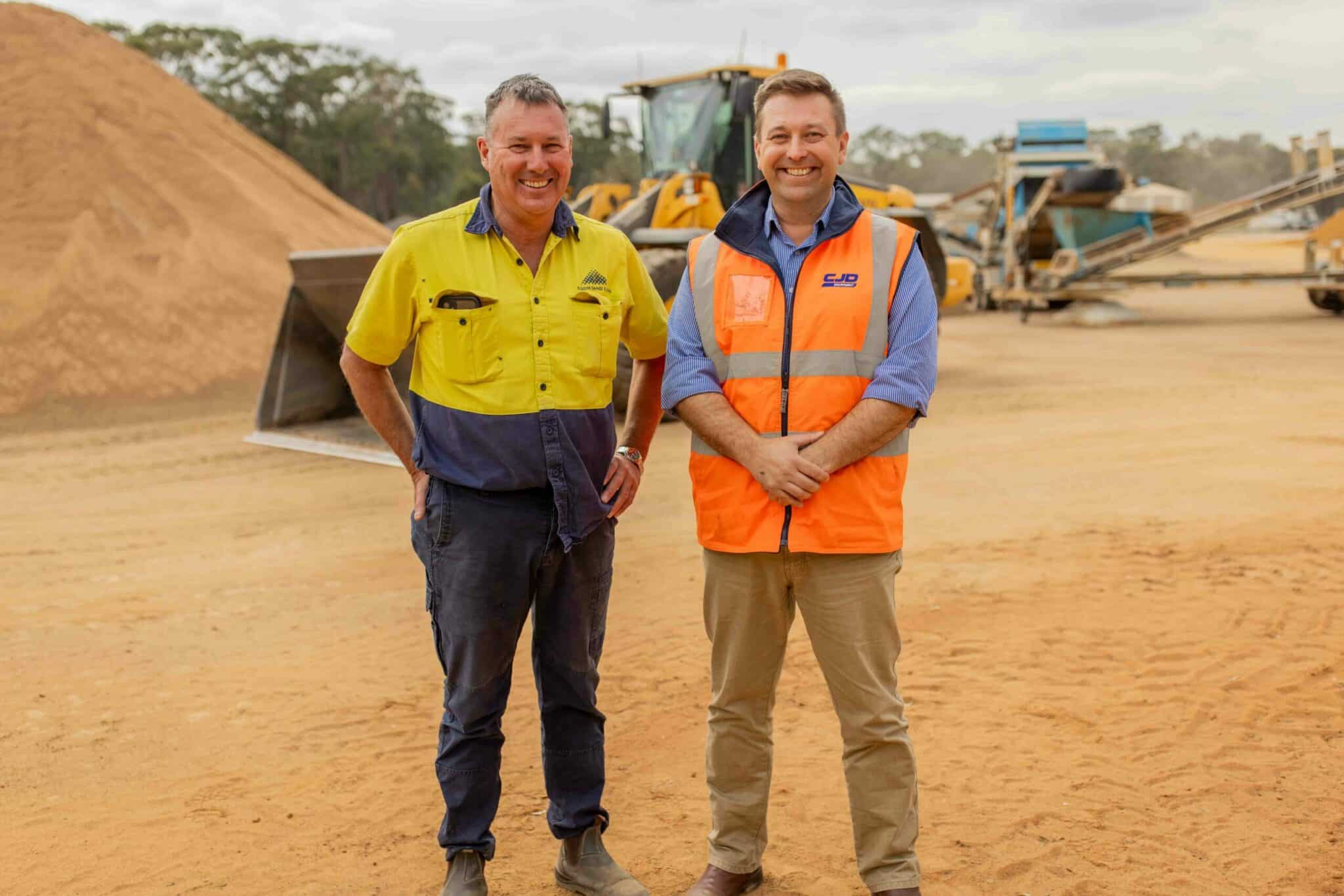The way owner, David Mills, tells it, Epsom Sand and Soil started out life as a side-hustle that grew too big for its boots.
“My old man had a concrete truck, carting ready mixed concrete. And a lot of the time he’d be finished up by lunchtime,” David explains. “So, he had a tipper on the back of his truck. And once they’d finished pouring all the slabs, he’d go and cart sand and fill house spaces. So, he did that for four years or so, until doing the sand and soil, was earning more than the concrete truck.”
It was around 1980 when David’s father, Ken, sold the concrete truck and bought the first tipper and front-end loader. “I was probably 16 when he started Epsom Sand and Soil,” he recalls. “I left school at 17. And dad had a partner in the business who was a boiler maker. So, I started off doing an apprenticeship as a welder. But after I did two years of that, Dad had a bit of a disagreement with that partner and ended up buying him out.”
The dissolution of the partnership left David at a bit of a loose end. “I couldn’t continue my welding apprenticeship – I would’ve had to find another company,” he says. “But at 18-and-a-half you could get your truck license, so I started driving the truck with the old man. At that stage, we’d employed a couple of guys and eventually we built up to owning three front-end loaders.”
With all the mining that goes on around Bendigo, where the business is based, there’s no shortage of sand. “We’d use mine sand to put underneath house bases,” David says. “Then we built a screening plant, which we used to screen brick sand. And we also sold topsoil, which we just bought in.”
Things got serious when the Mills family purchased a block of land, 25km out of Bendigo with a sizable sand deposit on it. “We ended up with a contract with Bendigo city council, supplying nature strip soil and topsoil for houses, along with brick sand and packing sand for underneath,” David recalls. “Once we built our own depot, we started carting road base and pine bark. That was from Bark King, who we’ve been associated with since the 1980s. We still buy from them today.”
Epsom Sand and Soil has always been a family business. “In the beginning it was my mum and dad,” David shares. “Then I married my wife, Ilka, in 1993. She joined the business around ’94 when Mum and Dad retired. It’s been me and Ilka running the business for the past 22 years.”
With Ken’s farming background and David’s welding and mechanical experience, the business enjoyed the benefit of their different areas of expertise. “On the mechanical side, fixing things, I had a lot more knowhow than Dad did,” David explains. “But if it was something to do with the tractor or whatever, he was always right,” he laughs.
That said, technology has moved on quickly with trucks and front-end loaders. Something which David is starting to notice when his son, Hayden, sits in the cab. “I’ve got a 15-year-old son. And the stuff they pick up on – like getting into a screen to try and find a fault or something like that on the machine or the truck – they’re just there in seconds,” he laughs. “I’m still fiddling around trying to work my way through it.”
Back in the beginning, the business kicked off with an old Chamberlain front-end loader and an International truck. “Later we had a couple of Leader and Scania trucks. But at some stage we moved on to Volvo,” he says. “And we’ve worked predominantly with them since around 1990.”
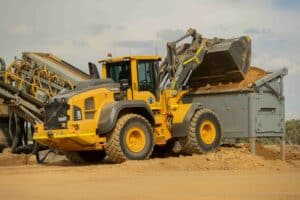
When it comes to loaders and diggers, David’s fleet is mainly Volvo. “We’ve got six Volvo front-end loaders and two Volvo excavators at the moment,” David says. “We’ve also got a smaller Komatsu 16-ton excavator and a Bobcat and a little three-and-a-half-ton excavator we mainly have just for our own use, tidying up around the yard and keeping sites clean.”
Back in the day, the business started with two Cat front-end loaders, but a twist of fate saw them make the switch to Volvo. “We were a loader down and we’d just started a contract with Bendigo Gold Associates carting gold tailings,” David recalls. “The Volvo salesman happened to walk in right when this loader had broken down and he told us he had a machine that had just finished a demo. He said if we collected it, we could have it as long as we wanted. So, we used that machine for three weeks until we got our Cat back. We ended up moving the Cats on and buying two Volvo loaders – a 4300 and a 4400. We’ve owned Volvos ever since.”
You’ll often see Volvos on sand quarries. David reckons they’re just well-suited to the job. “The Caterpillar and Komatsu loaders dig a little bit harder – probably got a better breakout force,” he says. “But the Volvos are smooth. And in sand they fill the bucket nicer and don’t dig holes. If you try to back out of a hole and you’re bouncing around, your sand falls out of your bucket. Volvos just put the power to the ground better.”
The Volvo’s are also packed with features. “There’s very few machines with front diff lock, which has been standard on Volvos for over 30 years,” David says. “Even air conditioning’s been standard since the first Volvo we bought in 1984. That was usually optional back then. You might have had a heater, but most machines didn’t come with air conditioning. And in Australia, you can put up with no heat, but you need your aircon.”
As an owner who also operates – we’re talking 40,000 hours in loaders and 15,000 in diggers – David’s well-placed to comment on the performance of the machines. “They’re very quick and nimble,” he says. “But really, it’s the comfort and quietness. You’re sitting in it for 12-hour days. If it’s quiet, you get out and feel no different to when you got in it. But with the roar of an engine at the back of you, it’s a different story.”
He also rates his Volvo Articulated Hauler very highly. “It’s a second-hand 35-tonner,” he says. “It’s just awesome. It doesn’t use any oil and can climb and drive in the sand better than anything else. You can drive it down a 45-degree angle into the pit and it’ll drive straight back out the same way. Because of the six-wheel drive they’ll go where a front-end loader or dozer can’t. And it does up to four days’ work on a 400-litre tank of diesel.”
In David’s line of work, dust is also a big issue. “On a Volvo, if you keep the doors and windows shut, there’s no dust in the cabin at all,” he says. “We did a job 15 years ago on the new sporting complex with Bendigo city council. And a lot of what they’d cleared off the site was cement sheet containing asbestos. Plenty had been smashed up over time and no one knew it was there until they put the sprinkler system in. Turned out it was littered over the whole ground. They had to strip 150mm off the top of the whole arena.”
Epsom Sand and Soil was brought on to screen the asbestos out of the soil. “For the first couple of days, they had monitors all set up around the oval, catching asbestos fibers. Then they’d send the filters from the monitors out for analysis. So, that first day I had to wear a respirator. I ended up asking if they could put a filter in my loader, because it was horrible wearing a respirator in there. So, they did and the next day he said not to worry about the respirator – they hadn’t found a single fiber inside the cab. That’s a pretty good demo of the filtration system.”
It’s that fine attention to detail Volvo’s famous for. David says he was once lucky enough to see that for himself at the factory. “It was way back in 1989,” he says. “I was amazed with how they moved the loaders around. They had like a hover craft underneath the loader, and they’d just plug that into an air hose. So, there’s a 25-ton front-end loader with one guy just pushing it around the workshop. Such a smart idea. Every part of what they do is just clever. And you see that reflected in the design and the operation of the machines.”
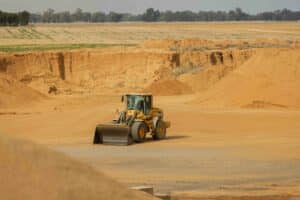 In terms of fuel economy, David says Volvo is streets ahead. “15 years ago, I did a demo with Komatsu when we were buying one of the L120s. We put the 420 Komatsu against the 120 Volvo, doing the same job,” he explains. “I was in one and another driver was in the other. We even swapped at lunchtime and knocked off at the same time, to keep it even. There was 60 or 70 liters of diesel difference over an eight-hour day. So, you’re getting an extra couple of days a week out of it for nearly nothing. That’s worth it when you’re running a fleet.”
In terms of fuel economy, David says Volvo is streets ahead. “15 years ago, I did a demo with Komatsu when we were buying one of the L120s. We put the 420 Komatsu against the 120 Volvo, doing the same job,” he explains. “I was in one and another driver was in the other. We even swapped at lunchtime and knocked off at the same time, to keep it even. There was 60 or 70 liters of diesel difference over an eight-hour day. So, you’re getting an extra couple of days a week out of it for nearly nothing. That’s worth it when you’re running a fleet.”
Speaking of which the business, David says, runs two L70Fs, three L120s, three L70s and an old L120B. “That’s an old one we just use in the yard,” he says. “It’s done around 20,000 hours and we use that for the coloured mulch job, putting a colourant through the woodchips we make with the Rotochopper. The loader doing that job ends up with the colour all over it. So, we wouldn’t want the newer loaders doing that.”
Apart from the man himself, the rest of the team are mainly truck drivers. “There’s two of us that are front-end loader operators.,” David explains. “And then the rest are truck drivers. But 90% of what we sell, we load our own trucks. And we don’t outsource much to subbies.”
The yard is a slick operation, with the business selling product almost as soon as they pull it out. “We’ve got two sandpits,” David says. “We supply four concrete plants in Bendigo with concrete sand from the new sand pit and then we’re doing our own brick sand out of the same pit. So that’s around 80,000 meters of sand a year.”
In that regard, keeping the machines in good working order is paramount, so they’ve optimised maintenance with a hybrid approach. “Our dealer, CJD Equipment, do the 1000-hour services and we do the 500-hour services in between,” David explains. “Cause they’re usually just changing the engine oil and a couple of filters. And we’ve had very few issues with the machines. We’ve never done an engine rebuild in a loader. And that old 120B in the yard has its original engine, transmission, and diffs. All it’s had is a new set of brake pads, a set of final drive gears and its turbo charger. It still loads trucks as good as a new loader would.”
Epsom Sand and Soil has been dealing with CJD Equipment since 1980. “We’ve had a great run with them,” he says. “Their back-up service is spot-on. Being a smaller company, you talk to the Victorian General Manager, Daniel Rice, direct. It’s just a little bit more personal. But they’re still a good size that they can accommodate anything you need.”
Getting work has never been a problem. David says they get by mainly on word of mouth. “You do the right thing, and the work comes to you,” he says. “We’re on all the socials and we do a little bit of TV advertising on a couple of local stations and on Facebook. That seems to work well with the smaller stuff. Sometimes, just for trial and error, we’ll put up a post selling a certain product cheap. Suddenly you get a heap of trailers coming in and sales for that product are up 50% on last month. Costs you nothing.”
So, what does the future hold for Epsom Sand and Soil? “I want to retire in the next five or six years,” David laughs. “Hayden could probably take it over if he wanted to. But I’m not going to pressure him into it. At 15 you have to work out what you want to do. But he’s certainly capable. He’s learned from a real young age. He can drive the Bobcat every bit as good as what I can. And he’s even built his own motorbike jumps.”
Motorbike riding is an activity David and Hayden share. “I used to do a lot of water skiing and speed boating, but I’m getting too old for that now,” David laughs. “But Hayden and I go away motorbike riding every now and again. He’s right into the motorbikes now. I just follow along at the back of the pack.”
These days, if Ilka and David want to take some time away, they’ve got backup sorted. “I’ve got my yard manager, Will Mayer, who can run the show if I want to go away on holidays,” David says. “Will’s been with us for about 13 years now. He’s at a stage where he can virtually do everything I do and that takes the pressure off us. So, we’re thinking, ‘let’s have a bit of a life.’”
After 22 years, they’ve certainly earned it.
